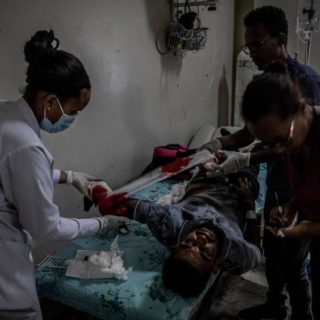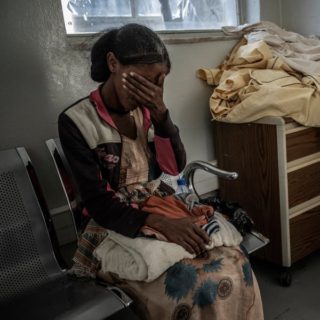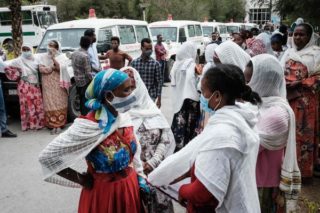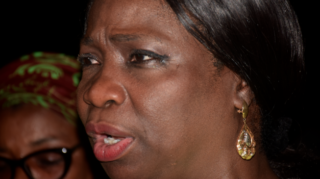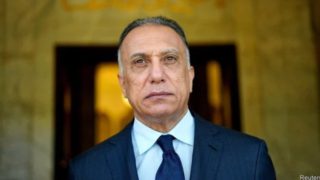Dozens of people were killed when a government airstrike slammed into a busy market in northern Ethiopia, medics and witnesses said, as fighting intensified in the restive Tigray region where federal forces are struggling to contain a broadening insurgency.
The airstrike appeared to be one of the deadliest single incidents of the eight-month civil war that has sullied the international reputation of Ethiopia’s Nobel Peace Prize winning leader, Abiy Ahmed. The attack was on Tuesday in Togoga, 15 miles west of the Tigrayan regional capital, Mekelle.
A day later, on Wednesday, Tigrayan rebels struck back against the government when fighters shot down an Ethiopian Air Forces C-130 transport plane as it approached Mekelle, causing it to smash into a field about 15 miles south of the city, according to the rebels and witnesses.
It pointed to an intensifying fight in Tigray, where fighters led by Ethiopia’s one-time ruling party, the Tigray People’s Liberation Front, captured areas south of Mekelle that until recently were controlled by soldiers from Eritrea. The rebels say they have captured several thousand Ethiopian soldiers and were holding them as prisoners of war.
A spokeswoman for Mr. Abiy referred questions to the military. A spokesman with Ethiopia’s military could not be reached for comment.
Mr. Abiy had hoped to deflect from international criticism of the war in Tigray, which has prompted many reports of massacres, sexual assault and ethnic cleansing, with national elections on Monday.
The vote was intended to signal Ethiopia’s move away from decades of harsh autocratic rule. But as before, violence in Tigray reared its head. Also as before, civilians paid the highest price.
On Tuesday, Tsilat Ashaber, 30, sat outside an operating theater in Mekelle’s Ayder hospital as surgeons sought to save her 2-year-old daughter, Eldana, who had been badly wounded hours earlier in the airstrike in Togoga.
Ms. Tsilat was selling onions and tomatoes from her street stall when a bomb landed in an area between restaurants and shops in the village at about midday on Tuesday, she said.
“Always, we are living in fear,” she said, tears rolling down her cheeks.
The scale of the attack in Togoga was not immediately clear because government soldiers prevented ambulances from reaching Togoga in the immediate aftermath, health workers and witness said. Just eight people, including Ms. Tsilat’s daughter, managed to reach Mekelle for treatment on Tuesday, hospital officials said.
But on Wednesday, the regional health authorities estimated that 80 people had been killed and another 43 wounded, according to a private report that was shared by a United Nations official in Ethiopia.
Ned Price, a spokesman for the State Department, said that the United States was “gravely concerned” by the reports and that “we strongly condemn this reprehensible act.”
The International Committee of the Red Cross said it had facilitated the evacuation of wounded people from Togoga in local Red Cross ambulances. A spokeswomen declined to provide details of the number of dead or wounded.
Doctors at Ayder hospital said that 33 people had received treatment including Negassie Berhe, 34, who grimaced as doctors worked to save his badly wounded left arm.
“I heard the sound of the jet, then a bomb landed in the middle of the crowd,” Mr. Berhe said. “I don’t know why.”

Tsilat Ashaber, 30, weeps as she waits for doctors in Mekelle to operate on her 2-year-old daughter, who suffered a perforated abdomen during the government airstrike in Togoga. Finbarr O’Reilly for The New York Times

Family members waited outside the Ayder Hospital in Mekelle, where Red Cross ambulances were waiting after being denied access to the site on Wednesday. Yasuyoshi Chiba/Agence France-Presse — Getty Images
Fighting in Tigray has escalated since the weekend when the Tigray Defense Forces — the armed wing of the T.P.L.F. — scaled up their operations, officials said.
In a phone interview, Getachew Reda, an executive member of the T.P.L.F., said in an interview that Tigray forces had targeted four divisions of the Ethiopian Army, and that his forces were holding over 3,000 Ethiopian soldiers as prisoners of war.
U.N. documents also confirm an escalation of violence in recent days. Throughout the course of last week, U.N. officials reported large-scale troop movements in northwestern and central Tigray, according to a confidential security document seen by The New York Times.
The United Nations received reports that Tigrayan rebels had entered Adigrat, 62 miles north of Mekelle, for several hours on Tuesday. But the town was later reported to have been retaken by Ethiopian and Eritrean forces. The Associated Press cited a local resident who said that federal police had since been seen beating people in the center of the town.
On top of the war, Tigray is also contending with a huge humanitarian crisis.
The fighting has killed thousands of people, displaced 2 million and pushed the region into the throes of famine — the worst in any country since a 2011 famine gripped neighboring Somalia, according to a senior United Nations official.
Mr. Abiy has rebuffed international entreaties to stop the fighting in Tigray and enter talks with the Tigrayans. In an effort to force both sides to talk peace, the United States announced visa restrictions on an unspecified list of Ethiopian, Eritrean and Tigrayan officials.
The main focus in Ethiopia this week, however, is on Monday’s national and regional parliamentary election.
The elections, which were delayed last year because of the coronavirus pandemic, were seen as a crucial test for Mr. Abiy, who had billed them as the country’s first free and fair vote ever.
After coming to power in 2018, Mr. Abiy promised to steer the country to democracy — reforming electoral laws, removing restrictions on opposition parties, and appointing a former political prisoner to head Ethiopia’s election board. Monday’s elections featured 46 parties and over 9,000 candidates — a record.
But voting did not take place in about one-fifth of constituencies because of the war in Tigray, ethnic violence in several other regions, and logistical problems. The main opposition parties boycotted the vote in Oromia, Ethiopia’s most populous province.
With the first results due in the coming days, it was widely expected that Mr. Abiy’s Prosperity Party, which dominates the state apparatus, would win a majority of seats and form the next government.
The latest mass killing in Tigray “raises the stakes further” for Mr. Abiy, said William Davison, senior Ethiopia analyst with the International Crisis Group.
“He will have to decide whether to use the mandate to prioritize preventing mass starvation in Tigray,” Mr. Davison said. “Or whether he doubles down on a war that looks unwinnable and is certain to lead to more mass civilian suffering.”
FEATURED IMAGE: Health care workers in Mekelle treating a man who was injured Tuesday by a government airstrike on a market in the nearby town of Togoga, in Ethiopia’s northern Tigray region. Finbarr O’Reilly for The New York Times
By Simon Marks and Abdi Latif Dahir/The New York Times

